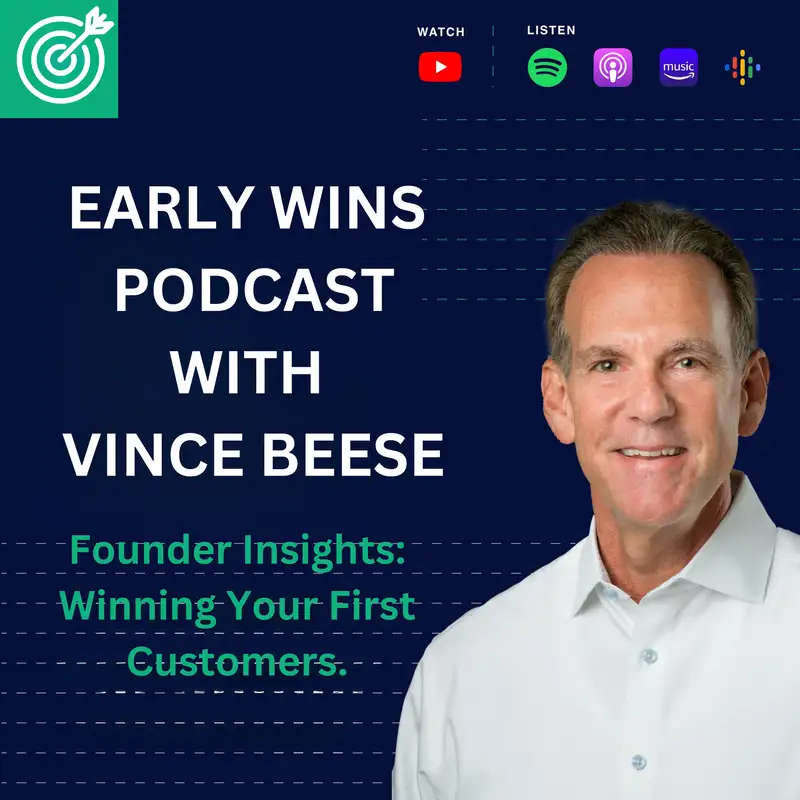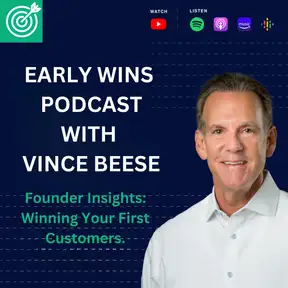Early Wins with Doug Kaufman
Hey. I'm Vince Beese, the host of the Early Wins podcast. And on this show, we interview startup founders to uncover their secrets to success closing their first customers. During this 10 minute and 3 question episode, you'll gain insights and lessons to help you land your first deals, find market fit, and chart your path to scalability. I'm excited to have Doug Kaufman, the founder of Belongly on our show today.
Speaker 1:And welcome to the show, Doug.
Speaker 2:Thanks, Vince. It's great to be here, and, I appreciate you doing this podcast. Hopefully, it helps a lot of people.
Speaker 1:I hope so too. Otherwise, what's the sense of doing it? Right?
Speaker 2:That's right. That's right.
Speaker 1:Hey. Before we get into the questions, tell us a little bit about what you're up to. Give us a little, back a channel, some, you know, experience what you've been doing and what you're up to it belongly, please.
Speaker 2:Sure. Well, post TransLoc and post taking some time away, I started a company that has become what Belongly is today, which is a platform for mental health providers. And what we really do now is we are focusing on trying to solve the 80% failure rate in mental health therapy. And that failure rate exists not because therapists aren't good or therapy doesn't work. It's because the clients, if you're looking for a therapist as a client, you need to be matched with a therapist that you end up trusting, liking, feeling like you have a warm relationship with and can work with that person.
Speaker 2:And unfortunately, nobody matches on those things. You just get matched with someone who's an expert and has availability on their schedule. That's a sure way to, not have a good outcome with therapy. So what we do is we use AI to help match clients with therapists they are most likely to have a warm trusting relationship with and therefore have the most success with.
Speaker 1:Sounds like a need in the marketplace, my friend.
Speaker 2:It is. It is.
Speaker 1:Are you ready for the first question?
Speaker 2:I'm ready for anything. Bring it on.
Speaker 1:So thinking your past, think of now, don't doesn't matter. What was that first big win as a founder that really helped propel things in your past experience? We're trying to pull out, like, you know, what are the details of that first big client and and why it was so impactful for the company?
Speaker 2:Yeah. Well, as you know, Vince, I've I've done 5 or 6 startups over what feels like a 100 years. So I'm I'm not gonna go back too far because it won't be relevant anymore. But if I go back to to the last company that I ran, that was that was TransLoc. That was a local company in the originally transit technology space, then mobility space.
Speaker 2:And really the biggest initial win on the enterprise level was Triangle Transit, the local public transit agency. And what TransLoc did, you know, TransLoc brought transit agencies online and made it possible to see where all the buses are in real time, get arrival predictions, all these great things, make sure routes are running efficiently. It's really, really amazing stuff. But the enterprise getting Triangle Transit, what was so great about it was it was not only an enterprise client, so moved the company from university clients to enterprise, but also it actually brought together all the local agencies onto one offering. So there was one map that had all the local agencies, Duke, NC State, Triangle Transit, everything you can imagine for the rider to see everything going on locally in one cohesive, easy to use system.
Speaker 2:And that was a huge win for the company at the time.
Speaker 1:Financially and also, of course, the actual logo. Right?
Speaker 2:It was financial. It was logo. It was also we ate up the entire local market. We got all the agencies in one shot. And what it did is it actually changed sales for enterprise in public transit, at least at the time.
Speaker 2:You know, there's a lot of, enterprises that are used to legacy services and legacy buying, and procurement, which means you get one vendor to do everything that you need
Speaker 1:Yeah.
Speaker 2:Under one umbrella, and that seems like a win. What TransLoc did, we went into the Triangle Transit and said, you should not go with one legacy agency or or offering because what you're gonna get is probably a good service for this one piece that you need. But these 10 other things that you need are gonna be mediocre at best. So you should get the best of best of breed of all the things you need. And we brought all of that to the table.
Speaker 2:So it wasn't just us. We brought a partnership in as well.
Speaker 1:So, Doug, now think about your first ten customers. Okay?
Speaker 2:K.
Speaker 1:What were some of the challenges you ran up that you guys recognized, and what did you do to overcome those challenges in your first deals?
Speaker 2:Yeah. So I was I'm just gonna stick with TransLoc.
Speaker 1:That's fine.
Speaker 2:So, you know, when I TransLoc, was the only company I'm the CEO of that I didn't found myself. So when I got to TransLoc, it was it was small. There were maybe 12 12 customers. I'm sorry, 12 employees and a handful of customers. And what was really interesting was I asked every single person at the company when I first got there, why do clients buy our product?
Speaker 2:And everybody gave me the same answer. And I said, well, how do you know? And they said, well, we just know. And I said, okay, this is a problem. So I said, actually, none of you know.
Speaker 2:You believe you have faith, but you don't know the truth. So we actually brought in a research company and did a research study. We talked to all of the existing customers, clients that did not buy from us, that went with someone else to find out exactly why. And so the mistake I would say, even though the company was doing fine, the mistake was not truly knowing why the customer was purchasing from us.
Speaker 1:Wow. Could you imagine that? You actually spoke to your customers and found out from then why they chose you guys. Right?
Speaker 2:Well, you know, it was a different different time and day back then, Vince. No. This is a visionary. A visionary. I am I know.
Speaker 2:This is why I'm on your podcast. I am spouting earth shattering wisdom.
Speaker 1:I'm curious. So from that research you did, were what your employees saying matching up to what your customers were saying?
Speaker 2:No. No. Not it was no. They had no idea why they were buying in reality. And not because they didn't know the product.
Speaker 2:They they knew the market. They knew the product. We have great employees. But they thought they were buying clients were buying our technology. It was the best technology available.
Speaker 2:That was not the case.
Speaker 1:From that research, from that study, what did you change?
Speaker 2:Well, we changed our sales and marketing for sure, and it changed the perspective of the company. So what we found is that clients were saying, I know that if I buy Translok, I'm going to look great to my boss. The agency is gonna look really good. The customer, the rider's gonna like us more. I'm gonna look good.
Speaker 2:I might get promoted. So there was like this little bit of vanity in it, and I don't mean that in a negative way. So now we could start tailoring our sales, our discussions, and our marketing to match why the customer was actually buying.
Speaker 1:That's awesome. That's awesome.
Speaker 2:Yeah. Yeah. There's also this one other thing real quick is that we really, really, really wanted transit agencies to buy on sustainability. Get cars off the road, save the planet. And they all all the transit agencies were in favor of it.
Speaker 1:Okay.
Speaker 2:They loved it. We talked about it. Yes. Yes. Yes.
Speaker 2:But they didn't never bought on it. They did not hand over money because of sustainability. So the mistake early on was not truly understanding what they wanted and just selling on that. You can throw the other things and sprinkle it in. But if you're spending 80% of your time discussing the things they don't buy on, you're wasting everybody's time.
Speaker 1:That makes a ton of sense. Yeah. Last question. What would be one piece of advice you give founders out there that are trying to land their first customers?
Speaker 2:Well, given the answers I've already given, this will be no surprise. It's not just talk to your customer, but you have to recognize that even an enterprise, if you're not selling to a business, you're not selling to a corporation, an LLC, a CE Corp, etcetera. You're selling to people. There's human beings. And so I would say focus on understanding the human being that's on the other side That's looking to buy your product.
Speaker 2:You know, get evangelists, build relationships, truly understand them, and you don't have a relationship if you're not talking to them and really digging into trying to understand them, their needs, their pain points, and how you can help them most. That would be my my number one thing.
Speaker 1:And that's similar to your advice in regards of the research on your customer base. Right? Like, it's do your research on your what you think your ICP is and the people at your ICP, what they care about to really understand how you can talk to them, how you can message them, how you can present your value. Right?
Speaker 2:That's right. I think, you know, in relationships I mean, coming the fact that I'm a psychologist, I'll throw some psychology in here. One of the things that kills relationships
Speaker 1:by the way? Or do we have to say
Speaker 2:This is totally free, but not for you. You're gonna pay me. Your audience gets this free. One of the things that really damages relationships is this thing called mind reading. Right?
Speaker 2:Like, you just start you get to this point, the longer you've been with someone, you expect they know what you're thinking and feeling, and how dare they not get you. Right? This is a problem. And this is what a lot of companies do. This is what we were doing at TransLoc.
Speaker 2:We just thought we knew what the people on the other side wanted. And that was that was really that that helped us get to where we were, but it was gonna block us from getting to the next level. And so I would just like reiterate to to your audience, don't mind read, don't go on faith, talk to the client, then get them to pay you, go on data, like, get fact, then you can build your faith, but your faith can be built on fact, not just opinion.
Speaker 1:Faith based based on fact. That sounds like a new religious organization. Let's end on that, miss my friend. Thank you for coming on early Wednesday.
Speaker 2:Thanks for having us. I really appreciate it.

